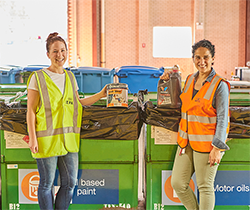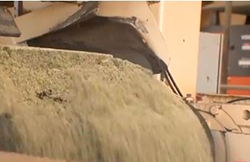Recycling surges in popularity - and the glass hits the road
The EPA’s Community Recycling Centre Network collected a record 2.971 million kilograms of waste last financial year. In other recycling news, the NSW Government has awarded more than $735,000 in grants to boost the use of recycled glass in road construction.

The Community Recycling Centre at Hornsby, like others around the state is well-used
Despite the challenges of bushfires and COVID-19, the EPA’s Community Recycling Centre Network surpassed all previous years this past financial year, collecting a record 2.971 million kilograms of household problem waste through the network! That is a 10.5% increase on the previous year.
Community Recycling Centres are permanent drop-off centres for common household problem wastes that can’t be collected via council kerbside waste and recycling. NSW householders can drop off problem wastes at these centres year round, free of charge.
EPA’s Head of Community Recycling Megan Webb told EPA Connect the centres continue to be hugely popular.
“We regularly receive positive feedback on these wonderful facilities operated in partnership with local councils,” she said.
“We now have 94 centres operating in NSW, including new facilities at Wagga Wagga and Kew – and we hope to have a few more open by the end of the year.”
The Community Recycling Centre page on the EPA’s website is the most visited with over half a million visitors last year alone.
Top facts and tips for using Community Recycling Centres
- Most of the items accepted at Community Recycling Centres can be reused or recycled. Sorting waste and taking it to a recycling centre helps improve recycling rates, saves water, energy and other valuable natural resources.
- You can take paint, motor oils, other oils, household batteries, gas bottles, smoke detectors, fire extinguishers, car batteries and fluoro globes and tubes to your Community Recycling Centre!
- Only household quantities of these materials will be accepted. - a maximum container of 20 litres or 20 kilograms for each waste type.
- Some centres may accept other types of waste. Contact your local centre to find out if other items are accepted and if any charges apply.
- Always handle and transport your items carefully. Protect your vehicle by placing a protective sheet or tray in the boot to capture any leakages or breakages.
- There are now 94 Centres operating in NSW – find one closest to you.
- Most Community Recycling Centres are open to all NSW residents. With the exception of Leichhardt and Cumberland, you do not have to be a local resident to use a centre
- You can take household chemicals to a mobile Household Chemical CleanOut event. This mobile collection service helps you safely dispose of a range of household chemical products, including household cleaners, pool and hobby chemicals and pesticides. CleanOut events are held at various locations in NSW on specified dates throughout the year.
Follow us on Facebook to get notified of events in your area and new community recycling centres as they open.

Glass is recycled back to a 'sand' state to be used in road seal
Paving the way for Recycled Glass
Creating innovative asphalt using recycled crushed glass (RCG) is now even easier thanks to new guidelines released by the NSW Government.
The guidelines will help industry navigate the steps for establishing and operating glass-recycling facilities, and processing glass to the standard required for use by Transport for NSW.
Transport for NSW has already incorporated the use of recycled crushed glass on a number of its construction and maintenance projects, and has the potential to use up to 45,000 tonnes in the next three financial years, which equates to 234 million glass bottles.
The NSW Government through the EPA has awarded more than $735,000 in grants to three separate projects which will unlock new markets for the use of recycled glass in road construction.
The grants will stimulate the reuse of construction and demolition waste, and the use of recyclable materials such as glass, plastics and cardboard in civil construction projects.

